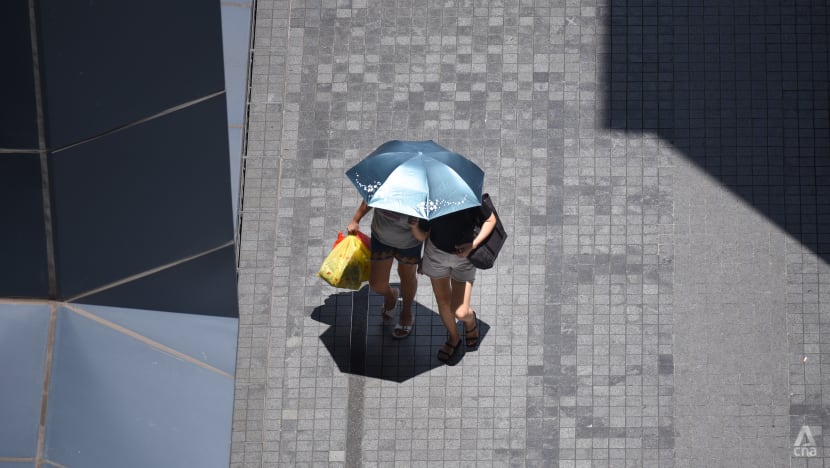Singapore designing effective heat mitigation strategies, scaling them up amid rising temperatures: Grace Fu

Two people shield themselves from the sun under an umbrella in Clementi. (File photo: CNA/Gaya Chandramohan)
SINGAPORE: Singapore is designing effective heat mitigation strategies and scaling them up amid rising temperatures, said Minister for Sustainability and the Environment Grace Fu on Tuesday (Aug 2).
Speaking in Parliament, Ms Fu said these strategies fall into two broad categories: Measures to promote cooling in the urban environment, as well as measures to reduce heat generated from human activities.
“Although Singapore has so far not faced heat crises on the same scale as other countries, it would not be possible to avoid the rise in temperatures due to global warming. We must continue to engage and co-create solutions with the community to enhance our resilience to climate change,” said Ms Fu.
Also answering questions from Members of Parliament, Senior Minister of State for National Development Tan Kiat How noted that current strategies to promote cooling in the urban environment include increasing greenery in industrial estates. Nearly 90,000 trees have been planted in industrial estates under the OneMillionTrees movement.
The Building and Construction Authority also requires buildings to be designed to limit heat gain from the exterior.
For existing towns, he noted that the Housing and Development Board (HDB) is conducting a pilot study on cool paint that can absorb less heat and reduce the ambient temperature of HDB blocks. The pilot is expected to be completed in 2024.
An islandwide network of sensors will also be deployed to monitor the cooling effects of tree planting efforts, said Mr Tan. The data collected will support microclimatic research in Singapore and help the National Parks Board to develop better greening strategies to cool Singapore.
In order to reduce heat generated from human activities, efforts have been made under the Singapore Green Plan to electrify the country's vehicle population and to increase the energy efficiency of industrial, commercial, and residential buildings, said Ms Fu.
IMPORTANCE OF INDIVIDUALS' ACTIONS
To prepare for rising temperatures, the Government has adopted a “science-based and proactive” heat mitigation and adaption strategy, said Ms Fu.
Other approaches to tackle the issue include deepening the understanding of the science behind how rising temperatures affect Singapore, as well as reviewing efforts to strengthen the community’s resilience to heat, she explained.
She added that individuals play an important role.
"When we use less electricity, we not only reduce the heat emitted from our own electrical appliances, we also reduce the energy that needs to be generated by our power stations, thereby reducing both heat generation and carbon emissions at the system level," she said.
"Hence, we have been enhancing community resilience to climate change by encouraging businesses and individuals to adopt greater energy efficiency, such as the introduction of the Mandatory Energy Labelling Scheme to help consumers choose more energy-efficient appliances."
Mr Tan added: “The Government takes a broad-based holistic approach that will help all segments of the population cope with rising temperatures. Dealing with impacts of climate change requires collective action and community resilience.
“Together, we will ensure that as a nation, we can adapt, adjust and remain resilient in the face of climate change.”


No comments
Share your thoughts! Tell us your name and class for a gift (: